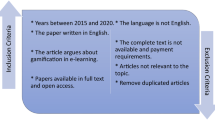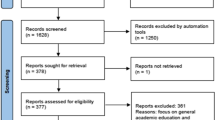Abstract
Intergenerational learning (IGL) has been identified as a viable way to help organizations deal with the problems an ageing worker population brings with it. Information and communications technology (ICT) in its many forms can be utilized to support IGL. This paper investigates the requirements for a game that would help raise stakeholder awareness for IGL, and allow individuals to practice skills related to it. By interviewing members of the European Union (EU)-funded SILVER-project we aim to find out suitable contexts, interventions and mechanisms that allow us to design such a game. Based on the interviews we found out that the game should be easily contextualized so that it works in—or is easily adapted to—different countries and cultures. For example sports or nature could be such contexts. As for mechanisms and interventions we found out that there are many possibilities. We conclude that such a logical combination of mechanisms and interventions that support the selected context must be chosen.

Similar content being viewed by others
References
Billet, S. R. (1999). Guided learning at work. In D. Boud & J. Garrik (Eds.), Guided learning in the workplace (pp. 151–164). London: Routledge.
Bontekoning, A. C. (2007). Generaties in organisaties (Generations in organisations). Tilburg: Tilburg University.
Clark, D. (2006). Games and eLearning. Available from http://www.caspianlearning.co.uk.
Colardyn, D., & Bjornavold, J. (2004). Validation of formal, non-formal and informal learning: policy and practices in EU Member States. European Journal of Education, 39(1), 69–89.
Connolly, T. M., Boyle, E. A., MacArthur, E., Hainey, T., & Boyle, J. M. (2012). A systematic literature review of empirical evidence on computer games and serious games. Computers & Education, 59(2), 661–686.
Denyer, D., Tranfield, D., & van Aken, J. E. (2008). Developing design propositions through research synthesis. Organization Studies, 29(3), 393–413.
Duvall, J., & Zint, M. (2007). A review of research on the effectiveness of environmental education in promoting intergenerational learning. The Journal of Environmental Education, 11, 14–24.
EAGLE (2013). Intergenerational practice in Europe, European approaches to inter-generational lifelong learning. Available from www.eagle-project.eu/, retrieved 30.10.2013.
Ellinger, A. D. (2005). Contextual factors influencing informal learning in a workplace setting: the case of “reinventing itself company”. Human Resource Development Quarterly, 16(3), 389–415.
ENIL (2013). European network for intergenerational learning. Available from www.enilnet.eu/, retrieved 28.10.2013.
EQUAL (2007). EQUAL: Paving the way for lifelong learning and age management. Available from http://ec.europa.eu/employment_social/equal/data/document/0711-athens-paving.pdf, retrieved September 2010.
Fuller, A., & Unwin, L. (2005). Older and wiser?: workplace learning from the perspective of experienced employees. International Journal of Lifelong Education, 24(1), 21–39.
Gadsen, V. L., & Hall, M. (1996). Intergenerational learning: A review of the literature: National center on fathers and families. Philadelphia NCOFF, University of Pennsylvania.
Gee, J. P. (2005). Learning by design: good video games as learning machines. E-Learning and Digital Media, 2(1), 5–16.
Ijsselsteijn, W., Nap, H. H., & de Kort, Y. (2007). Digital game design for elderly users. In Proceedings of the 2007 conference on Future Play, November 15–17, Toronto, Canada.
Kaplan, M. S. (2001). School-based intergenerational programs. Hamburg: UNESCO.
Kerka, S. (2003). Intergenerational learning and social capital. ERIC Digest, 244, 2.
Kuperschmidt, B. R. (2000). Multigeneration employees: strategies for effective management. Heatlth Care Manager, 19(1), 12.
Mannheim, K. (1963). The problem of generations. Psychoanalytic Review, 57(3), 378–404.
Newman, S., & Hatton-Yeo, A. (2008). Intergenerational learning and the contributions of older people. Ageing Horizons, 8, 31–39.
Ropes, D. (2010). Organizing professional communities of practice. Amsterdam: University of Amsterdam.
Ropes, D., & Ypsilanti, A. (2012). Factors influencing intergenerational learning: Towards a framework for organisations to ensure successful learning in older employees. In A. Barabasch & A. Dehmel (Eds.), Working and ageing: The benefits of investing in an ageing workforce (pp. 280–308). Luxembourg: Publications Office of the European Union.
Royce, W. (1970). Managing the development of large software systems. Proceedings of IEEE WESCON 26 (August). Los Angeles, CA, 1–9.
Spannring, R. (2008). Intergenerational learning in organisations—Literature report. Brussels: European Commission.
van Woerkom, M. (2003). Critical reflection at work: Bridging individual and organisational learning. The Netherlands: University of Twente, Enschede/Print Partners, Ipskamp.
Acknowledgments
We would like to thank the project’s partner countries for contributing their input for the development of this paper. This project was funded by the EU Grundtvig-GMP (project No: 517557-LLP-1-2011-1-NL-GRUNDTVIG-GMP)
Author information
Authors and Affiliations
Corresponding author
Rights and permissions
About this article
Cite this article
Räisänen, T., Ypsilanti, A., Ropes, D. et al. Examining the requirements for an intergenerational learning game. Educ Inf Technol 19, 531–547 (2014). https://doi.org/10.1007/s10639-014-9324-x
Published:
Issue Date:
DOI: https://doi.org/10.1007/s10639-014-9324-x




